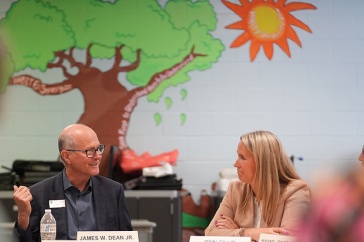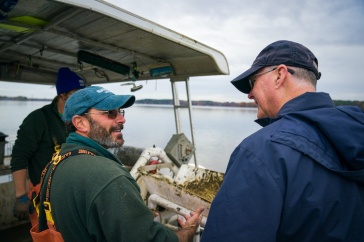
Amusingly enough given that his professional focus is pinpointing poll numbers as precisely as possible, in the runup to New Hampshire’s first-in-the-nation primary every four years, Andrew Smith, director of the UNH Survey Center, is inundated with so many media requests he doesn’t even try to calculate them.
“I give up on counting the number of media hits I’m involved with during that stretch – it’s in the hundreds during those two or three weeks leading up to and right after the primary,” Smith says. “It’s a tremendous boost to the university’s visibility.”
That boost comes thanks to the survey center’s sterling reputation forged over several decades, and the fact that the primary routinely puts both its Granite State Poll and Smith squarely in the limelight at a time when so much of the nation is tuning in – a flurry of activity Smith and his team are gearing up for yet again as the election cycle gets ready to heat up.
But the Granite State Poll is hardly a once-every-four-year phenomenon. It’s a monthly survey of public opinion in New Hampshire and a consistent tracker of the state’s pulse on any number of topics – and those well beyond state borders tend to pay attention. Though the media hits don’t pile up like they do during primary season, Smith still finds himself regularly fielding inquiries from national outlets as results are published, and it’s not uncommon for the survey to receive thousands of downloads.
"We are?at the intellectual forefront of developing these things. We're really ahead of the country in how this is being done."
Beyond political races the poll measures opinions on everything from hot button topics like gun control, abortion and perceptions of climate change to less fiery issues, like whether community members prefer a real or fake Christmas tree.
“The political stuff is about 5% of the work that we do, but it’s about 100% of our visibility,” says Tracy Keirns, assistant director of the survey center. That visibility has been earned thanks to the survey center’s national reputation as a trusted source, built over time and amplified during each presidential election cycle.
That visibility is also valuable, for several reasons. It showcases the poll as perhaps the most reliable tool available to help understand the opinions of people throughout the Granite State at any given time, and it also highlights the ways in which the UNH Survey Center continues to set itself apart as a leader in its field – most notably, as a pioneer in moving from the long-held standard of telephone surveys to a digital methodology that relies on text messaging and email.
“We are at the intellectual forefront of developing these things,” Smith says. “We’re really ahead of the country in how this is being done.”
Random digit dialing, where households were randomly selected by phone number, was the “gold standard for decades” in the polling industry, Smith says. But as cell phones took off in the 2000s and landlines became less of a necessity, response rates plummeted, from as high as 80% at their peak to as low as 6% nationally.
That resulted in a sharp rise in survey costs – between 2015 and 2020, Smith says, the cost of conducting a survey more than doubled, becoming “prohibitively high” for many organizations.
The UNH Survey Center was among the first to pivot to a fully digital model to combat these changes, Smith says. They began collecting email addresses from participants as early as the 2010s and had developed and honed a method of inexpensively texting and emailing people at random in the leadup to the 2020 presidential election. When COVID shut down UNH and everything else, it provided the impetus to fully focus on an all-digital survey methodology.
"We’re hoping we can use some of that visibility from the primary to get some attention on all of the things that we do. We want to let people know about all the great work that is happening here."
“That was basically a catalyst, and we’ve been working extensively at it since that time,” Smith says. “It was a long process, but COVID certainly accelerated it.”
Though large organizations like Gallup have utilized digital techniques, Smith notes that the UNH Survey Center was the first state-wide, probability-based panel to fully make the transition.
The survey center was able to clear some early technological hurdles and replicate much of the randomness that made the old telephone system so valuable, while also tapping into cost savings by conducting the entire operation digitally rather than over the phone.
“The whole industry was in this paradigm shift, and I think the inertia for us was other people were waiting around for someone to see how to do it right, and we just basically said, this is going to happen one way or another, let’s rip the Band-Aid off and jump right in,” Smith says. “We’ve been recognized as the premier polling organization in New Hampshire going back to the 1970s, so for us to move to this new approach was kind of a signal that this was probably the way things are going to be headed in the future.”
The transition to the digital approach during COVID also allowed the survey center to play a critical role in tracking important data for the state of New Hampshire. In partnership with the Dartmouth Medical Center the survey center created a COVID symptom tracker, and was later able to provide key information on vaccination numbers that was utilized by many state agencies.
The survey center continues to expand its offerings, as well. The Granite State Poll is an omnibus survey, which allows multiple clients to submit questions to a poll and share the cost savings rather than require each entity to create its own. The center is available to partner with those looking to gather data, and its services are also available to UNH faculty and staff.
The center’s reach goes well beyond state borders, as well, most notably through the creation of the States of Opinion Project, an effort to understand opinions of residents in all six New England states. The survey center built a probability-based web panel – currently complete in New Hampshire, Vermont and Maine and in progress in Massachusetts, Rhode Island and Connecticut – and has randomly selected and recruited panelists through phone, text-to-web and mail-to-web surveys.
As the New Hampshire primary rapidly approaches once again, the survey center is gearing up for yet another wave of attention, but the larger focus remains on spreading the word about its routine offerings to a wider audience, both on and off UNH’s Durham campus.
“We’re hoping we can use some of that visibility from the primary to get some attention on all of the things that we do,” Keirns says. “We want to let people know about all the great work that is happening here.”
-
Written By:
Keith Testa | UNH Marketing | keith.testa@unh.edu



















































